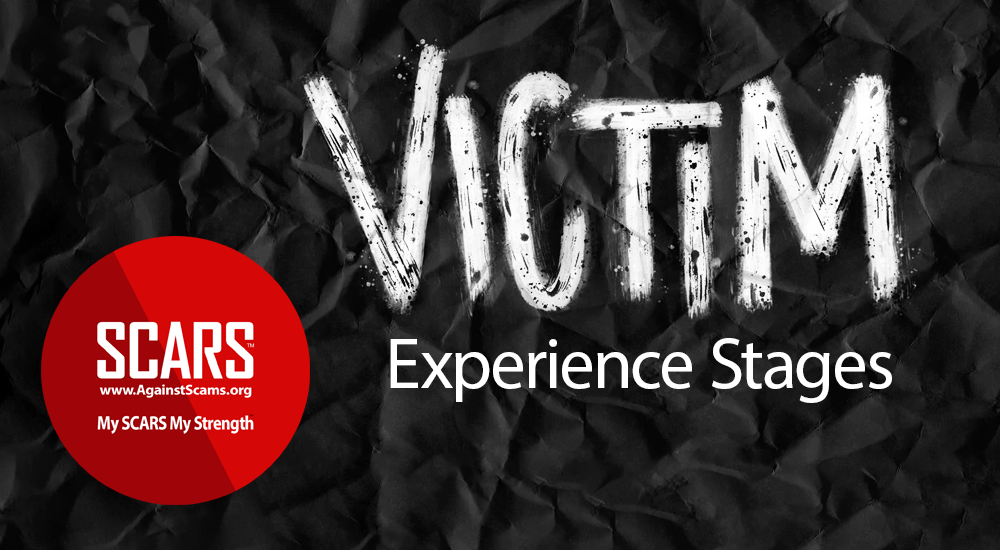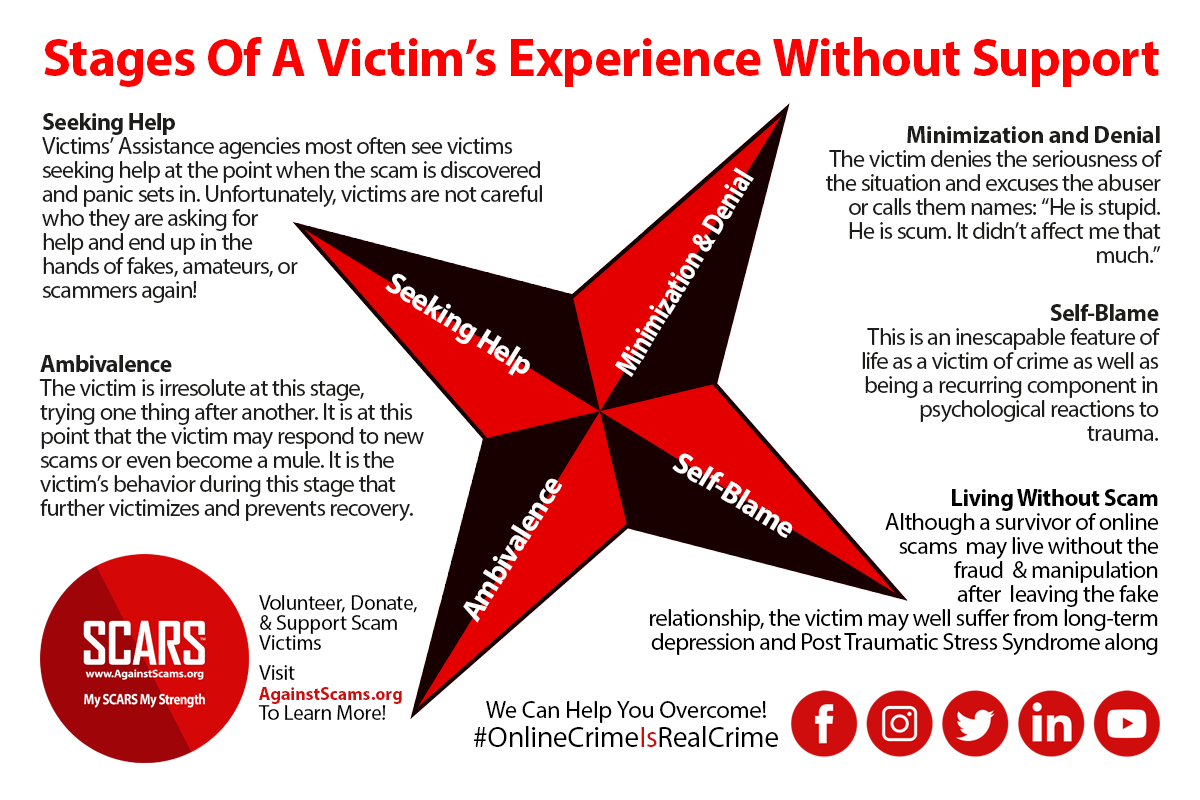The Stages Of A Victim’s Experience Without Getting Help & Support
After A Scam, Scam Victims Experience Several States – This Is A Different View Of That Experience From The Grief Cycle Or Stages Of Recovery
Professional support and counseling are crucial for scam victims following the end of a scam due to the significant impact it has on their well-being and recovery.
This summary of these scam victim stages refers to their experience without support, counseling, or therapy.
Basics:
Victim Minimization and Denial
The victim denies the seriousness of the situation and excuses the abuser or calls them names: “He is stupid. He is scum. It didn’t affect me that much.”
Victim Self-Blame
This is an inescapable feature of life as a victim of crime as well as being a recurring component in psychological reactions to trauma.
Victims Seeking Help
Victims’ Assistance organizations and service providers most often see victims seeking help at the point when the scam is discovered and panic sets in. Unfortunately, victims are not careful who they are asking for help and end up in the hands of fakes, amateurs, or scammers again!
Ambivalence
The victim is irresolute at this stage, trying one thing after another. It is at this point that the victim may respond to new scams or even become a mule. It is the victim’s behavior during this stage that further victimizes and prevents recovery.
Living Without Scams
Although a survivor of online scams may live without fraud & manipulation after leaving the fake relationship, the victim may well suffer from long-term depression and Post Traumatic Stress Syndrome along with a host of other stress reactions to the violence and trauma.
Lack of Support
Of course, all of this assumes the victim has not found a real support provider or other professional victims’ assistance. This is what typical victims go through with amateur hate groups.
This is quite a different picture if the scam victim obtains support from SCARS or other competent providers, such as local trauma counseling or therapist to help them through the recovery from their relationship scam and onto recovery.
Deeper Impacts On The Victim
However, there are also deeper lasting impacts for victims that do not get proper support.
Here are several reasons why it is essential for scam victims to receive such support, along with the potential dangers if they do not:
- Emotional Trauma: Scams can inflict severe emotional trauma on victims. They may experience a range of emotions such as shock, anger, shame, guilt, anxiety, and depression. Professional support provides a safe space for victims to process these emotions, validate their experiences, and work through the psychological aftermath of the scam. Without proper professional support or counseling, victims may struggle to cope with these emotions, leading to prolonged distress and potential mental health issues.
- Rebuilding Trust: Scams often involve a breach of trust, as victims are manipulated and deceived by perpetrators they believed to be trustworthy. Rebuilding trust in others can be a challenging process. Counseling helps victims understand the dynamics of manipulation, identify red flags, and develop healthy trust-building strategies. Without proper support, victims may become excessively suspicious or withdraw from relationships, hindering their ability to form new connections and move forward.
- Financial Recovery: Scams can result in significant financial losses, leaving victims in dire financial situations. Professional support can assist victims in developing financial recovery plans, providing guidance on managing debt, how to work with financial institutions, and exploring legal resources for recovery & restitution. Without this assistance, victims may struggle to navigate the complexities of financial recovery, leading to prolonged financial hardship and ongoing vulnerability.
- Coping with Shame and Stigma: Scam victims often experience intense feelings of shame and self-blame, influenced by societal misconceptions that they should have been more vigilant or cautious. Counseling helps victims challenge these distorted beliefs, recognize that they were manipulated, and rebuild their self-esteem. Without support, victims may internalize shame and isolate themselves, impeding their ability to seek help or share their experiences with others.
- Prevention of Revictimization: Scammers often target individuals who have previously fallen victim to scams, exploiting their vulnerabilities and psychological state. Professional support equips victims with the knowledge and skills to recognize potential scams, set boundaries, and assert themselves against manipulative tactics. Without adequate support, victims may remain unaware of the signs of future scams, making them more susceptible to being targeted again.
- Long-Term Psychological Consequences: The aftermath of a scam can have long-lasting psychological consequences if left unaddressed. Untreated trauma and emotional distress can contribute to the development of conditions such as post-traumatic stress disorder (PTSD), anxiety disorders, and depression. Professional counseling or therapy offers effective therapeutic interventions to mitigate these risks, promote healing, and prevent the escalation of mental health issues.
It is important to note that the dangers of not receiving professional support and counseling after a scam can vary depending on individual circumstances. However, overall, without appropriate assistance, victims may experience prolonged emotional suffering, financial difficulties, trust issues, social isolation, and an increased risk of being targeted by scammers in the future. Therefore, timely and tailored support is vital for scam victims to facilitate their recovery, promote resilience, and prevent further harm.
Resources
If you are a new victim, this is your starting point https://romancescamsnow.com/for-new-scam-victims/
SCARS provides a number of choices for scam victims, and in addition below are links to find trauma counselors and therapists in their community:
- Sign up for a SCARS support & recovery group: support.AgainstScams.org
- Find professional trauma counseling or therapy: counseling.AgainstScams.org
- Learn about scams and scammers: here on www.RomanceScamsNOW.com
- En Español: www.ContraEstafas.org
- See scammer photos (though we recommend caution for new victims): www.ScammerPhotos.com
-/ 30 /-
What do you think about this?
Please share your thoughts in a comment below!
Do You Need Support?
Get It Now!
SCARS provides the leading Support & Recovery program for relationship scam victims – completely FREE!
Our managed peer support groups allow victims to talk to other survivors and recover in the most experienced environment possible, for as long as they need. Recovery takes as long as it takes – we put no limits on our support!
SCARS is the most trusted support & education provider in the world. Our team is certified in trauma-informed care, grief counseling, and so much more!
To apply to join our groups visit support.AgainstScams.org
We also offer separate support groups for family & friends too.
Become a
SCARS STAR™ Member
SCARS offers memberships in our STAR program, which includes many benefits for a very low annual membership fee!
SCARS STAR Membership benefits include:
- FREE Counseling or Therapy Benefit from our partner BetterHelp.com
- Exclusive members-only content & publications
- Discounts on SCARS Self-Help Books Save
- And more!
To learn more about the SCARS STAR Membership visit membership.AgainstScams.org
To become a SCARS STAR Member right now visit join.AgainstScams.org
To Learn More Also Look At Our Article Catalogs
Scam & Crime Types
More SCARS
- ScamsNOW Magazine – ScamsNOW.com
- ContraEstafas.org
- ScammerPhotos.com
- AnyScam.com – reporting
- AgainstScams.org – SCARS Corporate Website
- SCARS YouTube Video Channel














Leave A Comment